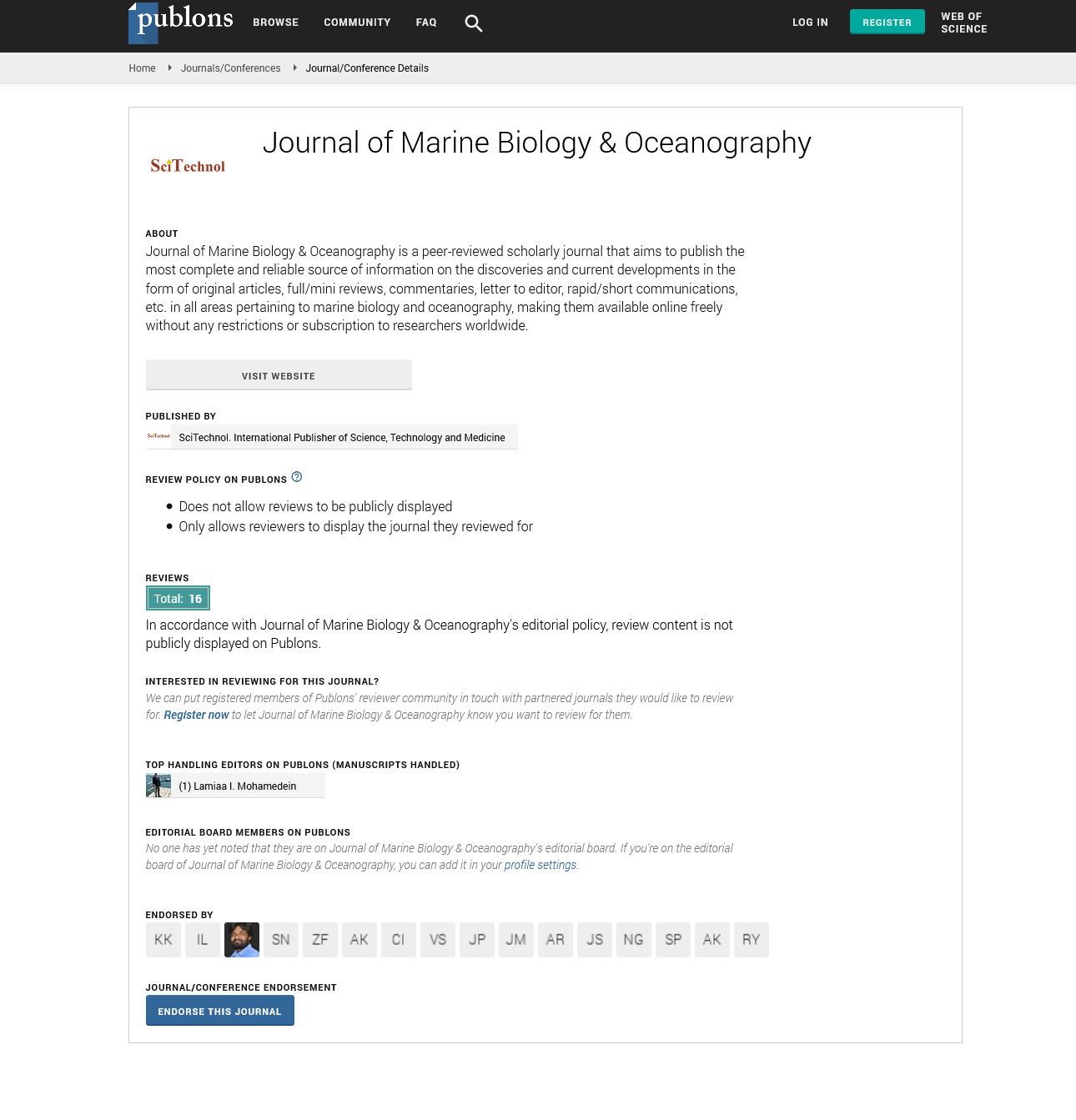Perspective, J Mar Biol Oceanogr Vol: 12 Issue: 1
Vitality of Limnology in Water Resource Management
Caren Furey*
Department of Biology, Clarkson University, Potsdam, USA
*Corresponding Author: Caren Furey
Department of Biology, Clarkson University, Potsdam, USA;
E-mail: juanvarona@usn.uk
Received date: 14 February, 2023, Manuscript No. JMBO-23-95564;
Editor assigned date: 16 February, 2023, PreQC No. JMBO-23-95564 (PQ);
Reviewed date: 03 March, 2023, QC No. JMBO-23-95564;
Revised date: 10 March, 2023, Manuscript No. JMBO-23-95564 (R);
Published date: 20 March, 2023, DOI: 10.4172/2324-8661.1000254.
Citation: Furey C (2023) Vitality of Limnology in Water Resource Management. J Mar Biol Oceanogr 12:1.
Abstract
Water is a precious natural resource that is essential for all forms of life on Earth. It plays an important role in various human activities such as agriculture, industry, domestic use, and recreation. With an increasing global population and climate change impacts, the demand for water resources is rapidly growing, leading to various challenges in managing this precious resource sustainably. Limnology, the study of freshwater bodies such as lakes, rivers, wetlands, and reservoirs, plays a vital role in water resource management by providing essential insights into the ecological, physical, and chemical processes that govern freshwater ecosystems. Water resource management involves the planning, development, and sustainable use of water resources to meet the needs of present and future generations. Limnology provides valuable information for effective water resource management through the study of freshwater ecosystems. One of the key areas where limnology contributes significantly is in understanding the ecological dynamics of freshwater systems. Freshwater ecosystems are complex and dynamic, with a wide range of species and interactions that are essential for their functioning. Limnologists study the biodiversity, distribution, and abundance of different species in freshwater ecosystems, their ecological roles, and their responses to environmental changes. This information is important for identifying and protecting sensitive aquatic habitats, conserving endangered species, and restoring degraded freshwater ecosystems. Furthermore, limnology provides valuable information for managing water resources in the face of climate change. Climate change is affecting freshwater systems in various ways, including through changes in precipitation patterns, temperature, ice cover, and hydrological cycles. Limnology studies the impacts of climate change on freshwater ecosystems, including changes in water availability, habitat suitability, and species distribution. This information is necessary in developing adaptive management strategies to protect freshwater resources, such as altering water allocations, developing drought and flood management plans, and implementing climate-resilient water infrastructure.
Limnology also plays a significant role in understanding the social and economic aspects of water resource management. Water resources are not just ecological systems but also social systems that involve multiple stakeholders with diverse interests, values, and governance structures. Social and economic aspects of water resource management, including water governance, water allocation policies, water pricing, water rights, and stakeholder engagement, have been studied. This information is important in developing Integrated Water Resources Management (IWRM) approaches that consider the social, economic, and ecological dimensions of water resources and promote sustainable water management practices. Furthermore, limnology plays a vital role in the development of innovative and sustainable water management technologies. It conducts studies on various technologies such as constructed wetlands, artificial recharge, water treatment, and ecosystem-based approaches for water resource management. They also evaluate the performance, costs, and environmental impacts of these technologies, and provide recommendations for their application in different contexts. This information is valuable for decision-makers, policymakers, and water managers in making informed choices on sustainable water management practices.
Conclusion
Limnology is a major field of study that contributes significantly to water resource management. It provides valuable information on the ecological, physical, and chemical processes that govern freshwater ecosystems, the impacts of human activities and climate change, and the social and economic aspects of water management. It also contributes to the development of monitoring and assessment programmes, innovative technologies, education and outreach efforts. However, addressing the challenges and limitations of limnology requires interdisciplinary approaches, improved data collection and analysis, and better coordination among stakeholders.
 Spanish
Spanish  Chinese
Chinese  Russian
Russian  German
German  French
French  Japanese
Japanese  Portuguese
Portuguese  Hindi
Hindi 
